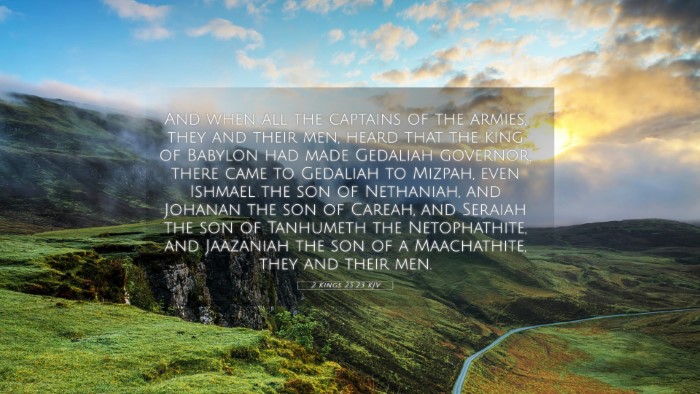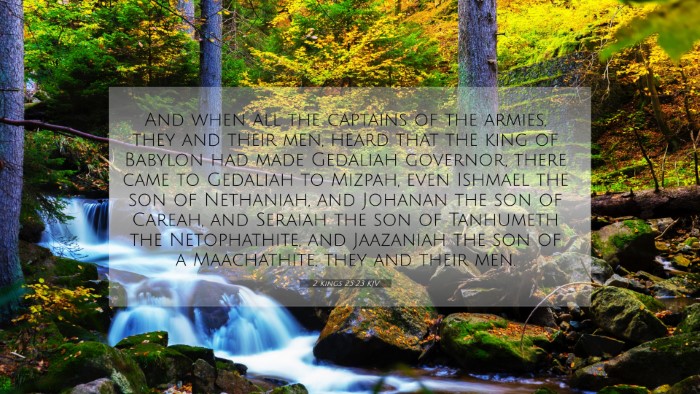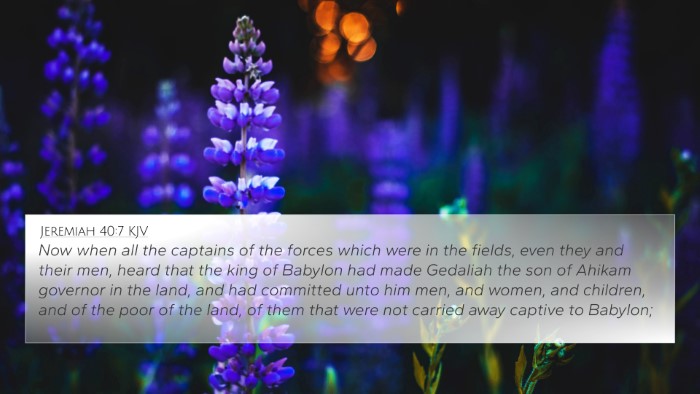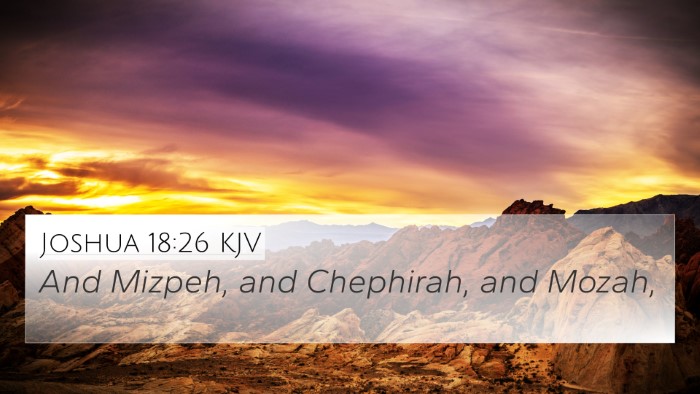Meaning and Insights of 2 Kings 25:23
Bible Verse: 2 Kings 25:23 - "And when all the captains of the armies, they and their men, heard that the king of Babylon had made Gedaliah governor, they came to Gedaliah to Mizpah, even Ishmael the son of Nethaniah, and Johanan the son of Careah, and Seraiah the son of Tanhumeth the Netophathite, and Jezaniah the son of a Maachathite, they and their men."
Overview and Context
This verse occurs in a historical narrative that recounts the events following the destruction of Jerusalem by Babylon. It marks the beginning of Gedaliah's governorship, appointed by the Babylonians, and illustrates the various leaders who grouped around him during a tumultuous time.
Insights from Commentaries
- Matthew Henry: He emphasizes the significance of Gedaliah's appointment and the hope it represented for those left in the land. It was a time of transition as the remnant sought to reconstruct their lives post-exile.
- Albert Barnes: Barnes highlights the motivations of the captains and their mens’ actions coming to Gedaliah. It was a practical response to the new political landscape, showcasing their need for leadership and stability.
- Adam Clarke: Clarke notes the various individuals mentioned and their backgrounds, indicating a diverse coalition of leadership. Their unity under Gedaliah suggests a collective yearning for resolution amidst uncertainty.
Interpretation and Thematic Connections
The verse is rich in themes that can be linked to various biblical principles and teachings. Below is a detailed examination of its meaning and connection to other scriptures.
- Thematic Importance of Leadership: The appointment of Gedaliah can be likened to other biblical examples of leadership such as Moses (Exodus 18:21) and Joshua (Joshua 1:1-2) who were chosen to guide their people through challenging circumstances.
- Hope and Restoration: The coming of captains to Gedaliah symbolizes hope for restoration, similar to how Joseph's rise to power in Egypt provided safety for his family (Genesis 45:8-11).
- Unity in Adversity: The gathering of diverse leaders reflects biblical themes surrounding unity, akin to 1 Corinthians 1:10, where Paul calls for unity among believers despite differing backgrounds.
- God’s Sovereignty: This transition of power shows God's hand at work in unsettling times, paralleled with Romans 13:1 which affirms that all governing authorities are established by God.
Bible Verse Cross-References
To better understand 2 Kings 25:23 and its implications, consider these cross-references:
- Jeremiah 40:5: This verse directly mentions Gedaliah’s appointment and God’s word regarding it.
- Jeremiah 42:1-6: This passage shows the inquiry of the remnant regarding their safety and future, directly connecting their plight to Gedaliah's leadership.
- Isaiah 45:1: Highlights God's sovereignty and the appointing of leaders based on His divine plans.
- Exodus 3:10: God's commissioning of leaders like Moses illustrates the pattern of divine appointments.
- Nehemiah 1:3: The grieving of Nehemiah over Jerusalem’s state can be related to the challenges Gedaliah faced.
- Proverbs 21:1: A reminder that the heart of the king is in the hand of the Lord, supporting the theme of God’s control over leadership.
- Micah 2:12-13: Speaks about the gathering of God's people, reminiscent of the captains coming to Gedaliah.
Conclusion
2 Kings 25:23 serves as a profound illustration of leadership during instability, the importance of seeking guidance, and the hope of restoration. The insights provided by various commentaries highlight the multifaceted nature of this period in Israel's history and the broader scriptural themes it touches upon.





